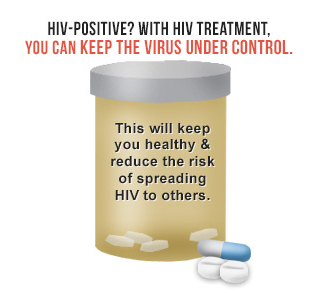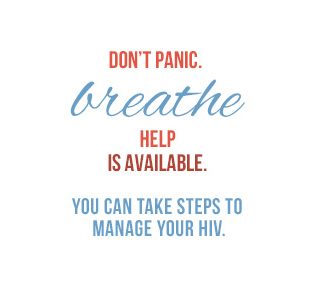What Does "HIV-Positive" Mean?
If you have just been diagnosed with HIV, you may have many questions: What does it mean to be HIV-positive? Does it mean that you have AIDS? Is HIV manageable? What are some of the first things you need to think about and do?
Being diagnosed with HIV means that you have been infected with the Human Immunodeficiency Virus (HIV) and that two HIV tests—a preliminary testand a confirmatorytest—have both come back positive.
Once you have been infected with HIV, you will always carry it in your body. There is no cure for HIV. It is a serious, infectious disease that can lead to death if it isn't treated. But there is good news: by getting linked to HIV medical care early, starting antiretroviral therapy (ART), adhering to your medication, and staying in care you can keep the virus under control, and live a healthy life.
Being HIV-positive also means that it is possible for you to pass the virus along to others, including your sexual partners. If you are female, you could also pass it along to your unborn child. Through treatment for HIV disease, you can suppress the virus and reduce the chances of transmitting HIV to others.
Do I Have AIDS?
Being HIV-positive does NOT necessarily mean you have AIDS. AIDS is the most advanced stage of HIV disease. If you are diagnosed early, start treatment, and adhere to your medication, you can stay healthy and prevent the virus from developing into AIDS. Ask your healthcare provider for more specifics about exactly what stage of HIV infection you have. To learn more, see Stages of HIV Infection.
Is HIV Manageable?
Yes, today HIV is a manageable disease. HIV medications have significantly changed the course of HIV infection since the early days of the epidemic and with the proper care and treatment, you can live a healthy life.
The sooner you take steps to protect your health, the better. Early treatment with antiretroviral drugs and a healthy lifestyle can help you stay well. Prompt medical care prevents the onset of AIDS and some life-threatening AIDS-related conditions.
To view the personal stories of others who have been diagnosed with HIV and learn how they managed their infection and got the virus under control with medication, visit AIDS.gov’s Positive Spin.
Related Topics on AIDS.gov
Frequently Asked Questions
If I am diagnosed with HIV, can a healthcare provider tell who gave me the infection?
No. HIV tests cannot determine who gave you the infection.
If I am diagnosed with HIV, can I tell when I got it?
In general, no. A skilled healthcare provider can generally estimate how long you have been infected by looking at the levels of virus in your body, your CD4 (T-cell) count, and whether or not you have had any opportunistic infections. If you are currently suffering from symptoms of acute HIV infection, a healthcare provider can usually conclude that infection occurred within the past few weeks. (For more on acute HIV infection, see Stages of HIV Infection.)
If I am diagnosed with HIV, will I have a normal lifespan?
Life expectancy for many people living with HIV who start treatment early, remain adherent to HIV medications and stay in care is similar to that of HIV-negative individuals.
Additional Resources
- AIDSinfo – Just Diagnosed: Next Steps After Testing Positive for HIV
- AIDSinfo – Staying Healthy with HIV: Newly Diagnosed
- AIDS InfoNet – Living with HIV (fact sheet series)
- CDC – Living with HIV
- HHS Office on Women’s Health – Starting HIV Treatment
- VA – Just Diagnosed with HIV
Last revised: 04/10/2015



